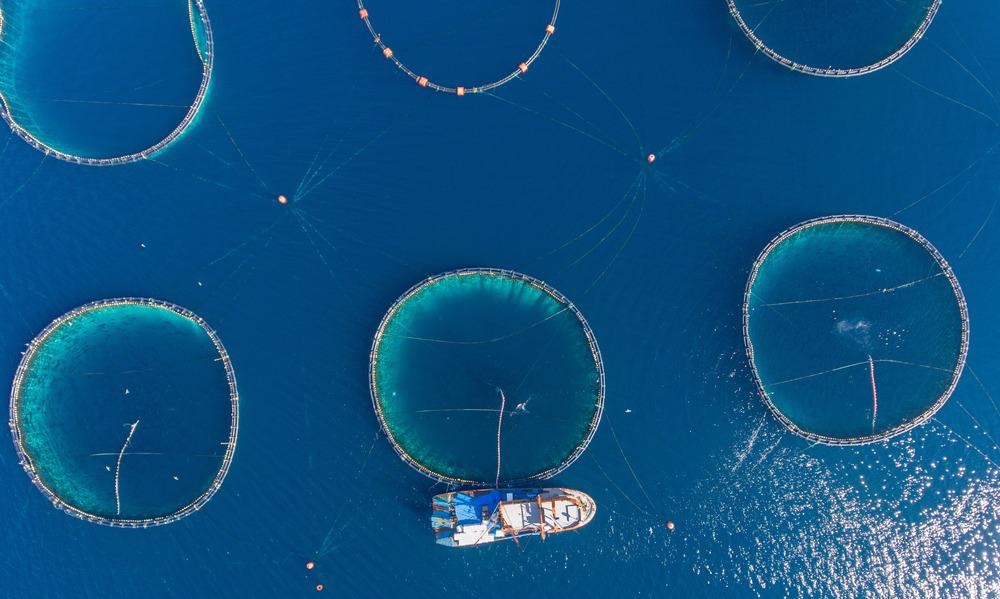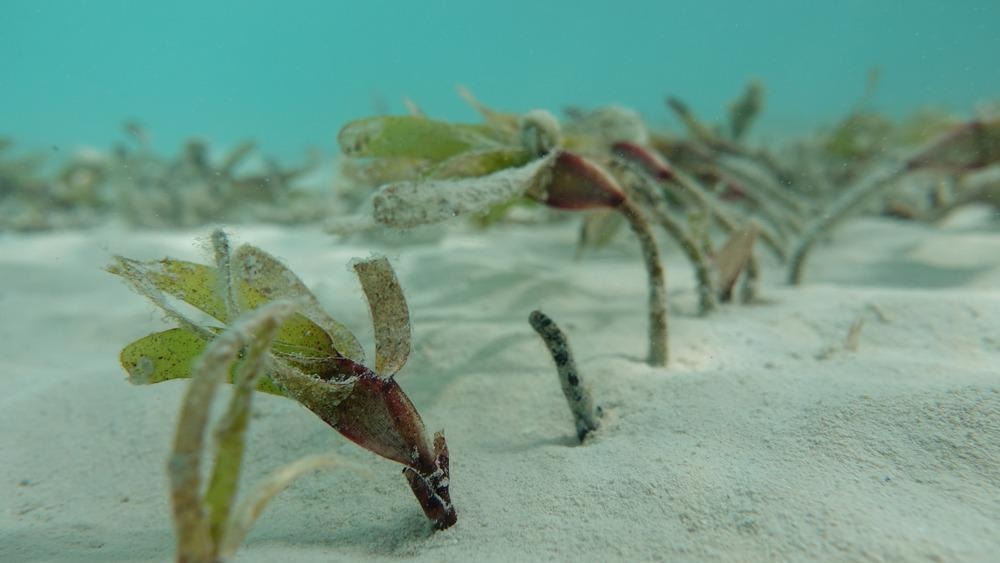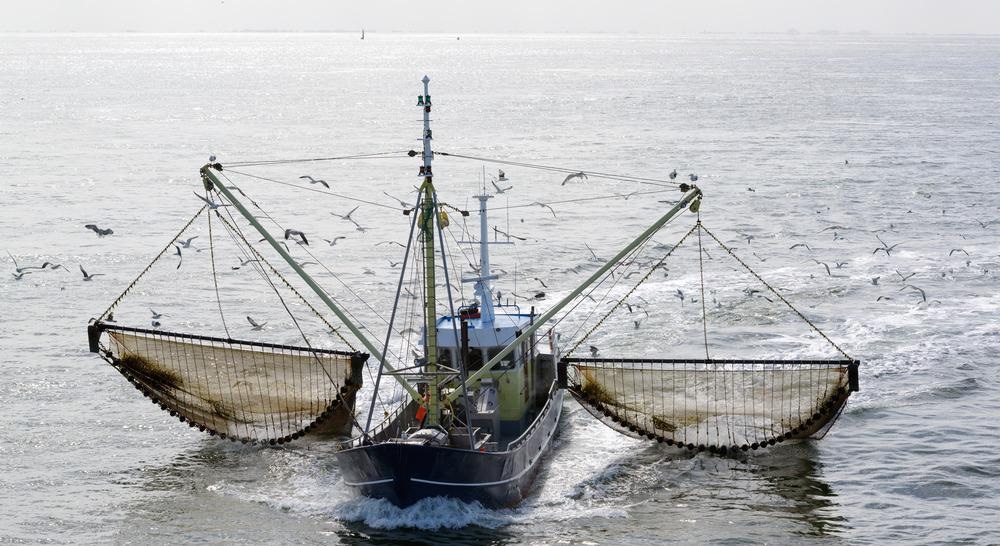A report by leading UK environmental organizations has urged the fishing industry to take immediate steps to decarbonize the sector, increase marine biodiversity, and protect carbon sinks in so-called blue carbon in the marine environment. Sweeping policy changes such as reducing subsidies for fisheries are needed, according to the report.

Image Credit: Eran Hakim/Shutterstock.com
“Shifting Gears”: New Report on UK Fishing
The new report, Shifting Gears: Achieving Climate Smart Fisheries, sets out the environmental impact of the fishing industry and outlines some steps that the authors believe will curb fishing’s harmful effects. The report says that failing to follow these steps will result in the UK being unable to reach its climate and nature recovery goals, as set out in government policy.
The fishing industry contributes to human-induced climate change. From greenhouse gas emissions from the use of fossil fuels on ships to disturbing marine ecosystems and disrupting the blue carbon system, the industry must answer for more than just the overall health of wild fish stocks.
The report is written in partnership with the Marine Conservation Society (MCS), the UK branch of the World Wild Fund for Nature (WWF), and the Royal Society for the Protection of Birds (RSPB).
The UK will host COP26 (the 26th United Nations Climate Change Conference) in Glasgow, Scotland in November, so the authors of the report are calling on UK governments to act on commitments made in the UK Fisheries Act and improve fishing industry environment regulations for the rest of the world.
The report was developed by the Scottish offices of the three NGOs and has a specific focus on Scottish fisheries. As the devolved Scottish government is responsible for 61% of UK seas, the report’s authors argue that it has a key role in fostering a more sustainable fishing industry in the UK.
The report comes as international attention is refocused on climate issues with the latest Intergovernmental Panel on Climate Change report issuing a stern warning to urgently decarbonize the global economy to avoid the worst-case-scenario outcomes of climate change forecast by scientists.
Three Goals for the Fishing Industry
The report is centered on three main goals that it says will lead to a “climate-smart,” sustainable UK fishing industry in the future:
- Reduce the UK fishing fleet’s carbon emissions
- Reduce or reverse the damage from unsustainable fishing practices to enhance marine biodiversity
- Protect blue carbon habitats to increase capacity for UK seas to act as a carbon sink
How Does Fishing Harm the Environment?
The fishing industry has for a long time been regulated by governments to prevent it from depleting stocks of wild fish in the oceans, therefore destabilizing marine ecosystems. Simply put, taking animals out of their habitat for consumption has an impact on that habitat and wider ecological systems. If fewer animals are removed from their habitat, then there is less environmental impact.
Marine ecosystems are further harmed with heavy fishing gear – trawling and dredging, for example – that damages delicate ecosystems in the sea. As well as removing natural habitats and endangering marine life with the risks of bycatch, this also breaks up and releases what is becoming known as blue carbon (discussed below).
Around the world, 207 million tons of CO2 are emitted into the atmosphere by fishing vessels annually. Almost a million tons of CO2 are released by UK fishing vessels each year. In the UK, half of all the vessels in the entire fishing fleet are more than 30 years old and are powered inefficiently with fossil fuel.
What is Blue Carbon?
The new report also underlines the role of the fishing industry in depleting blue carbon reserves in the sea. Blue carbon is a name given to any storage of carbon in marine habitats. Blue carbon has more carbon capture and storage capacity per unit area than terrestrial ecosystems such as forests and peatlands.
Marine habitats such as seagrass meadows, salt marshes, and mangrove and kelp forests draw CO2 out of the water around them and out of the atmosphere, in the same way that plants and trees do on dry land. Carbon can be stored in the plants themselves, as is the case with seaweed and seagrass, or in the seafloor sediment where the plants have their roots. Marine animals such as seabirds, fish, and larger mammals also absorb some of this carbon through the food chain.

Image Credit: Citrus deliciosa/Shutterstock.com
Blue carbon sinks – large areas that draw a lot of carbon out of the atmosphere and hydrosphere like forests on land – exist in large saltmarsh and seagrass habitats. These blue carbon sinks draw down and store up to 450 million tons of carbon each year.
Saltmarsh and seagrass systems such as these could be four times as effective as mature tropical rainforests at capturing and sequestering CO2. These habitats in the UK have a carbon storage potential of up to 2000 km² of tropical forests. There are approximately 500,000 km² of shelf seas around the UK’s shoreline, and between them, these could store an estimated 205 million tons of carbon in seabed sediments alone. Coastal seagrass and saltmarsh habitats add a further 15 million tons of carbon storage and sequestration capacity to this figure.
Carbon-rich habitats such as seagrass meadows and muddy sediments are destroyed by common fishing practices. A total of 87% of fish landed by the UK fishing vessels is caught using demersal trawl, dredgers, and seine nets. All these methods damage the seabed and reduce the ocean’s ability to absorb carbon.
The disruption of marine ecosystems caused by depleting stocks of wild fish also impairs their ability to act as carbon sinks, according to the report. Fish live in a complex ecosystem with many different parts relying on each for overall system health. Removing them from these ecosystems has subsequent consequences for the system, including its ability to store carbon.
There is still not enough research to understand the complex ways in which marine habitats and ecosystems draw carbon out of the atmosphere and hydrosphere, store it, and how this storage is affected by changes to the marine environment. Because of this, the report calls for more research into blue carbon.
Reducing Greenhouse Gas Emissions in UK Fishing
To reduce greenhouse gas emissions by the UK fishing industry, the report calls for an end to government fuel subsidies for fishing vessels. Fisheries use “red diesel,” fuel that is not taxed as highly as regular fuel for commercial and consumer use. It is dyed red to help authorities check if it has been used illegally.
Removing this subsidy would encourage fishing to operate on a more energy-efficient basis, avoiding wasteful practices and working harder to minimize fossil-fuel consumption.
By preventing fisheries from using red diesel, the report says the UK government will drive innovation and enable decarbonization in the sector. It suggests fishing operations will move away from energy-intensive methods such as bottom-towed dredging and trawling – methods that also pose risks to marine habitats and blue carbon.

Image Credit: Split Second Stock.Shutterstock.com
Electric and hybrid vessels would also become more commonplace. As well as reducing greenhouse gas emissions, using these vehicles also reduces noise pollution in marine environments.
Alternative fuels such as hydrogen would also see a revived interest in fuel subsidies were taken away from the fishing industry. Scotland is a good place to pitch investment and interest in hydrogen, as the Orkney islands off the country’s north coast have been recognized as a world leader in hydrogen production.
The report also touches on marketing and ecotourism opportunities for low-emissions or net-zero emissions fishing operations.
What are the Report’s Key Recommendations?
As well as cutting fuel subsidies for fishing vessels by taking away their ability to use red diesel, the report provides several clear regulatory recommendations to reduce the environmental harms caused by fishing in the UK.
It says that bottom-towed fishing gear should be banned from protected waters, which make up over a third of waters in the UK. Limiting towing gear in important sites that are not yet officially recognized is also recommended.
Governments should also make remote electronic monitoring cameras and GPS technology mandatory on all fishing vessels to drive transparency in the industry.
The report claims that the first UK fish stock audit since Brexit, published in early 2021, showed that only three of the UK’s top ten fish populations were being fished at or below the maximum sustainable yield.
Demersal (whitefish) fish stocks have regained health in recent years, although this is a result of strict regulation and the imposition of quotas. The total decrease in recent fish landings in the UK is thought to be attributed to UK fisheries catching fewer pelagic (oily) fish species as a result of increased regulation.
The fishing industry responds to this report calling for more regulation by citing the success of previous regulations in terms of environmental harm reduction.
References and Further Reading
“Comment: Greens Open New Front In Attacks On Industry.” (2021.) Fishing News. [Online] https://nifca.gov.uk/.
Keane, K. (2021). “Scotland's Fishing Fleet Urged to Take Steps to Go Green.” BBC Scotland. [Online] https://www.bbc.co.uk/news/uk-scotland-58246143.
Marine Management Organisation and Office of National Statistics. “UK Sea Fisheries Statistics 2019.” Gov.uk. [Online] https://assets.publishing.service.gov.uk.
MCSUK and Rewilding Britain (2020). “Blue Carbon: Ocean-Based Solutions to Fight the Climate Crisis.” MCSUK. [Online] https://www.mcsuk.org/.
MCSUK, WWF, and RSPB (2021). “Shifting Gears: Achieving Climate-Smart Fisheries.” MCSUK. [Online] https://www.mcsuk.org/.
McVeigh, K. (2021). “Seaspiracy: Netflix Documentary Accused of Misrepresentation by Participants.” Guardian. [Online] https://www.theguardian.com/environment/2021/mar/31/seaspiracy-netflix-documentary-accused-of-misrepresentation-by-participants.
“NGOs Call for More Cuts In Fishing to Save Climate.” (2021.) Fishing News. [Online] https://nifca.gov.uk/.
Riglen, V. (2021). “Climate Smart Fisheries: Our New Report.” MCSUK. [Online] https://www.mcsuk.org/news/getting-climate-smart-our-new-fishery-report/.
WWF (2021). “Shifting Gears: Achieving Climate-Smart Fisheries.” WWF. [Online] https://www.wwf.org.uk/achieving-climate-smart-fisheries.
Disclaimer: The views expressed here are those of the author expressed in their private capacity and do not necessarily represent the views of AZoM.com Limited T/A AZoNetwork the owner and operator of this website. This disclaimer forms part of the Terms and conditions of use of this website.